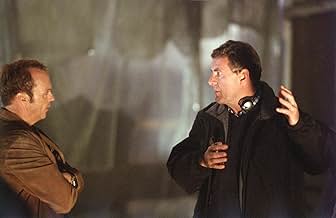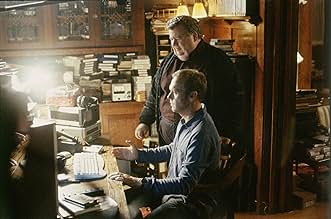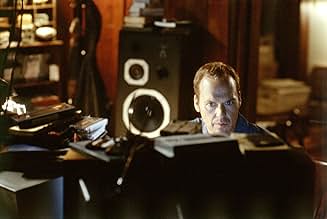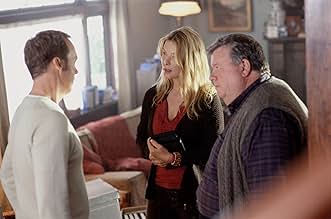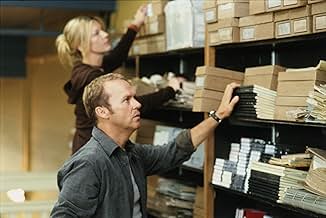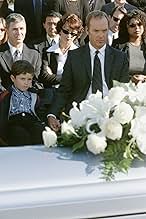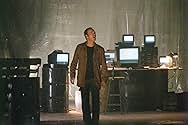IMDb-BEWERTUNG
5,5/10
51.448
IHRE BEWERTUNG
Der Wunsch eines Architekten, von jenseits des Grabes mit seiner Frau zu sprechen, wird zu einer Besessenheit von übernatürlichen Auswirkungen.Der Wunsch eines Architekten, von jenseits des Grabes mit seiner Frau zu sprechen, wird zu einer Besessenheit von übernatürlichen Auswirkungen.Der Wunsch eines Architekten, von jenseits des Grabes mit seiner Frau zu sprechen, wird zu einer Besessenheit von übernatürlichen Auswirkungen.
- Auszeichnungen
- 1 Gewinn & 2 Nominierungen insgesamt
Handlung
WUSSTEST DU SCHON:
- WissenswertesThe EVP recording from the trailer ("I will see you no more") that is attributed to a woman named Ruth Baxter, who died in 1987, is supposedly a recording from Point Lookout, a "haunted" lighthouse in Maryland, made by an EVP researcher named Sarah Estep. The lighthouse was used as a hospital during the Civil War, and some interpretations of the recording believe it to say, "I was seeing the war", or "I was seeing the water". While the recording is said to be authentic by the AAEVP, the Ruth Baxter story is fictional.
- PatzerThough the story is set in Washington, the filmmakers make no attempt to conceal British Columbia licence plates.
- Zitate
Raymond Price: [after John hears a ghost cursing at them] There are some very bad people out there. They can't all be Anna.
- Crazy CreditsThe opening of the film starts with: "Nobody knows whether our personalities pass on to another existence or sphere, but if we can evolve an instrument so delicate to be manipulated by our personality as it survives in the next life such an instrument ought to record something..." Thomas Edison 1928 E.V.P.; (Electronic Voice Phenomenon) The recording of voices and images of the dead, using de-tuned receiving apparatus. Identified in 1939, and now the subject of increasing scientific research worldwide, to finally evidence communication with the deceased.
- VerbindungenFeatured in WatchMojo: Top 10 Movies That Will Make You Paranoid (2015)
- SoundtracksBurn Away
Written and Performed by Ray O'Donnell, Liam Carty and Fran Carlyon
Ausgewählte Rezension
Jonathan Rivers (Michael Keaton) is a successful architect. His wife, Anna (Chandra West) is an even more successful novelist. When Anna goes missing one night, they fear she is dead. Suddenly, an odd man named Raymond Price (Ian McNeice) shows up and tells Jonathan that his wife has been trying to contact him from "the other side", via Electronic Voice Phenomena (EVPs). Rivers also gradually gets wrapped up in EVPs, which lead him to some unusual situations and the heart of a mystery.
I had a very divided reaction to White Noise. Some aspects were excellent, but in many ways, the film had potential that was never actualized. There are also some flaws that kept drawing me out of the film's universe. Overall I felt the film worked, but probably not as writer Niall Johnson and director Geoffrey Sax intended.
Let's talk about what the film did right first. The major assets, as mentioned in the title of my review, were the production/set design, cinematography and overall atmosphere. The latter largely hinges on the first two. The production/set design and cinematography were nearly perfect. Everything was focused on the idea of white noise, especially the most well known visual depiction of white noise--television "static" or "snow". The credits introduced a motif of jarring intrusions of white noise, which occasionally recurred throughout the film (although perhaps not enough). There were clever instantiations of a visual "white noise" theme in the sets, such as the outside waterfall on the lower level of Jonathan's apartment building, and the wall of glass blocks inside his apartment. The color scheme was white, silver and blue, washed out so that the film had an almost black and white feel. There were also more abstract references to white noise, such as the running water motif (water dynamics are mathematically chaotic, as is white noise, which is also thought of as being literally random), and the arcing electricity. All of this combined to provide a wonderful, gloomy atmosphere, and in another film, would easily compensate for any minor flaws to bring the film up to a 10.
However, there are a number of problems with White Noise. Keaton's performance was the major sticking point for me. He seems aloof and brooding throughout the entire film. While that may have been perfect for Batman, it doesn't work for me here. Both McNeice and Deborah Kara Unger (as Sarah Tate) were fine, but their roles were minor enough to not be able to carry the film. I usually like Keaton a lot, and I can't say that I dislike him here, but his performance is very odd and off-putting.
Another problem was the pacing. For a long time, White Noise may as well have been a realist drama. While that's fine for other films, it also doesn't tend to work in a horror/thriller. The only directors I've seen really able to pull that combination off effectively are Alfred Hitchcock and M. Night Shyamalan. It takes so long to get to the horror/thriller part of the story that many people likely either lose interest by that point, or they're interested because they'd rather see a realist drama, and the more supernatural ending will be unsatisfying for them. The pacing also doesn't fit with the white noise/chaos motif. This is a film that should have been edited like a Michael Bay vehicle.
Finally, I had a number of problems with the story. One, there are quite a few superfluous elements (such as Jonathan's son). Two, although I'm not someone who usually complains about genre combinations, there was an attempt to make White Noise both a "benevolent spirit" story, ala Ghost (1990) and a Ring (2002)-like otherworldly threat. The two just didn't meld. Three, the thriller aspect, which enters primarily at the climax of the film, seems too tacked on to engender an appropriate emotional reaction from the audience. And four, the supernatural aspects and especially the "twist revelation" of the ending are very rushed and unpleasantly ambiguous, possibly in an attempt to hide the fact that the plot in these respects wasn't very well thought out. There is a tremendous amount of potential in the script, and it is entertaining enough to marginally recommend, but this seems more like an early draft that was rushed to completion, or possibly a film that suffered a lot of studio meddling.
The bottom line is that while there are enough positive elements to make White Noise worth a watch to serious genre fans and students of film-making, do not expect the story to grab you by the short and curlies, and do not expect much of a resolution. Enjoy the film primarily for its visuals. I'm generously rating the film a 7 out of 10.
I had a very divided reaction to White Noise. Some aspects were excellent, but in many ways, the film had potential that was never actualized. There are also some flaws that kept drawing me out of the film's universe. Overall I felt the film worked, but probably not as writer Niall Johnson and director Geoffrey Sax intended.
Let's talk about what the film did right first. The major assets, as mentioned in the title of my review, were the production/set design, cinematography and overall atmosphere. The latter largely hinges on the first two. The production/set design and cinematography were nearly perfect. Everything was focused on the idea of white noise, especially the most well known visual depiction of white noise--television "static" or "snow". The credits introduced a motif of jarring intrusions of white noise, which occasionally recurred throughout the film (although perhaps not enough). There were clever instantiations of a visual "white noise" theme in the sets, such as the outside waterfall on the lower level of Jonathan's apartment building, and the wall of glass blocks inside his apartment. The color scheme was white, silver and blue, washed out so that the film had an almost black and white feel. There were also more abstract references to white noise, such as the running water motif (water dynamics are mathematically chaotic, as is white noise, which is also thought of as being literally random), and the arcing electricity. All of this combined to provide a wonderful, gloomy atmosphere, and in another film, would easily compensate for any minor flaws to bring the film up to a 10.
However, there are a number of problems with White Noise. Keaton's performance was the major sticking point for me. He seems aloof and brooding throughout the entire film. While that may have been perfect for Batman, it doesn't work for me here. Both McNeice and Deborah Kara Unger (as Sarah Tate) were fine, but their roles were minor enough to not be able to carry the film. I usually like Keaton a lot, and I can't say that I dislike him here, but his performance is very odd and off-putting.
Another problem was the pacing. For a long time, White Noise may as well have been a realist drama. While that's fine for other films, it also doesn't tend to work in a horror/thriller. The only directors I've seen really able to pull that combination off effectively are Alfred Hitchcock and M. Night Shyamalan. It takes so long to get to the horror/thriller part of the story that many people likely either lose interest by that point, or they're interested because they'd rather see a realist drama, and the more supernatural ending will be unsatisfying for them. The pacing also doesn't fit with the white noise/chaos motif. This is a film that should have been edited like a Michael Bay vehicle.
Finally, I had a number of problems with the story. One, there are quite a few superfluous elements (such as Jonathan's son). Two, although I'm not someone who usually complains about genre combinations, there was an attempt to make White Noise both a "benevolent spirit" story, ala Ghost (1990) and a Ring (2002)-like otherworldly threat. The two just didn't meld. Three, the thriller aspect, which enters primarily at the climax of the film, seems too tacked on to engender an appropriate emotional reaction from the audience. And four, the supernatural aspects and especially the "twist revelation" of the ending are very rushed and unpleasantly ambiguous, possibly in an attempt to hide the fact that the plot in these respects wasn't very well thought out. There is a tremendous amount of potential in the script, and it is entertaining enough to marginally recommend, but this seems more like an early draft that was rushed to completion, or possibly a film that suffered a lot of studio meddling.
The bottom line is that while there are enough positive elements to make White Noise worth a watch to serious genre fans and students of film-making, do not expect the story to grab you by the short and curlies, and do not expect much of a resolution. Enjoy the film primarily for its visuals. I'm generously rating the film a 7 out of 10.
- BrandtSponseller
- 19. Jan. 2005
- Permalink
Top-Auswahl
Melde dich zum Bewerten an und greife auf die Watchlist für personalisierte Empfehlungen zu.
- How long is White Noise?Powered by Alexa
Details
- Erscheinungsdatum
- Herkunftsländer
- Offizielle Standorte
- Sprache
- Auch bekannt als
- White Noise
- Drehorte
- Produktionsfirmen
- Weitere beteiligte Unternehmen bei IMDbPro anzeigen
Box Office
- Budget
- 10.000.000 $ (geschätzt)
- Bruttoertrag in den USA und Kanada
- 56.386.759 $
- Eröffnungswochenende in den USA und in Kanada
- 24.113.565 $
- 9. Jan. 2005
- Weltweiter Bruttoertrag
- 91.196.419 $
- Laufzeit1 Stunde 41 Minuten
- Farbe
- Sound-Mix
- Seitenverhältnis
- 2.35 : 1
Zu dieser Seite beitragen
Bearbeitung vorschlagen oder fehlenden Inhalt hinzufügen

Oberste Lücke
By what name was White Noise - Schreie aus dem Jenseits (2005) officially released in India in English?
Antwort

